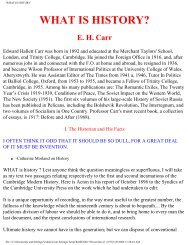The bronze age and the Celtic world - Universal History Library
The bronze age and the Celtic world - Universal History Library
The bronze age and the Celtic world - Universal History Library
Create successful ePaper yourself
Turn your PDF publications into a flip-book with our unique Google optimized e-Paper software.
6o THE BRONZE AGE AND THE CELTIC WORLD<br />
Time will show whe<strong>the</strong>r <strong>the</strong> suggestion, which I have put forward, that <strong>the</strong><br />
Prospectors, who seem to have been responsible for introducing <strong>the</strong> use of metal into <strong>the</strong><br />
west <strong>and</strong> north, to which <strong>the</strong>y came in search of precious ores, started originally from <strong>the</strong><br />
Persian Gulf, or whe<strong>the</strong>r, indeed <strong>the</strong>y were but sojourners in sou<strong>the</strong>rn Mesopotamia,<br />
having arrived <strong>the</strong>re by sea from some more distant l<strong>and</strong>, bringing with <strong>the</strong>m <strong>the</strong> seeds<br />
of civilisation) as <strong>the</strong> legends of Oannes, <strong>the</strong> exalted fish-man, as given by Berosus, seem<br />
to indicates.'*^<br />
Be this as it may, <strong>the</strong>re seems to be adequate evidence of a trade, starting in <strong>the</strong><br />
eastern Mediterranean <strong>and</strong> going first to Malta <strong>and</strong> Sicily, <strong>and</strong> <strong>the</strong>nce to Spain, Brittany,<br />
<strong>the</strong> British Isles <strong>and</strong> <strong>the</strong> Baltic. That <strong>the</strong> prime object of such trade was <strong>the</strong> procuring<br />
of gold, copper, tin <strong>and</strong> amber, seems equally certain, as does <strong>the</strong> fact that megahthic<br />
monuments are found associated with all <strong>the</strong> sites whence <strong>the</strong>se commodities could<br />
be obtained, as well as upon <strong>the</strong> l<strong>and</strong> routes connecting <strong>the</strong>m. Fur<strong>the</strong>r, a certain type<br />
of man, whom we term <strong>the</strong> Prospector, is found Hving in no small numbers in most of<br />
<strong>the</strong>se megahthic areas, as weU as becoming a successful merchant at many of <strong>the</strong> sea-port<br />
towns of Europe. Lastly we have seen that this trade, <strong>the</strong>n in <strong>the</strong> h<strong>and</strong>s of Babylonians,<br />
had reached <strong>the</strong> Mediterranean by 2800 B.C., was in touch with Malta, Sicily <strong>and</strong> Spain<br />
between 2600 <strong>and</strong> 2300 B.C., <strong>and</strong> scarcely later had reached Brittany, Irel<strong>and</strong> <strong>and</strong><br />
<strong>the</strong> Baltic.<br />
Thus it seems clear that <strong>the</strong> Prospectors, in search of metal, reached <strong>Celtic</strong> l<strong>and</strong>s,<br />
where <strong>the</strong>ir descendants may yet be found. What langu<strong>age</strong> <strong>the</strong>y spoke is uncertain ;<br />
it may have been aUied to Etruscan or to Sumerian. But judging from <strong>the</strong>ir<br />
cosmopolitan habits, one may surmise that <strong>the</strong>y were polyglot, <strong>and</strong> adopted <strong>the</strong> langu<strong>age</strong><br />
of <strong>the</strong> country in which <strong>the</strong>y settled. We can, <strong>the</strong>n, hardly expect to detect any<br />
survivals of <strong>the</strong> Prospector tongue in <strong>the</strong> modern <strong>Celtic</strong> langu<strong>age</strong>s, unless undeed it be some<br />
loan words connected with <strong>the</strong> metal trade.<br />
48 King (1910) 53.







